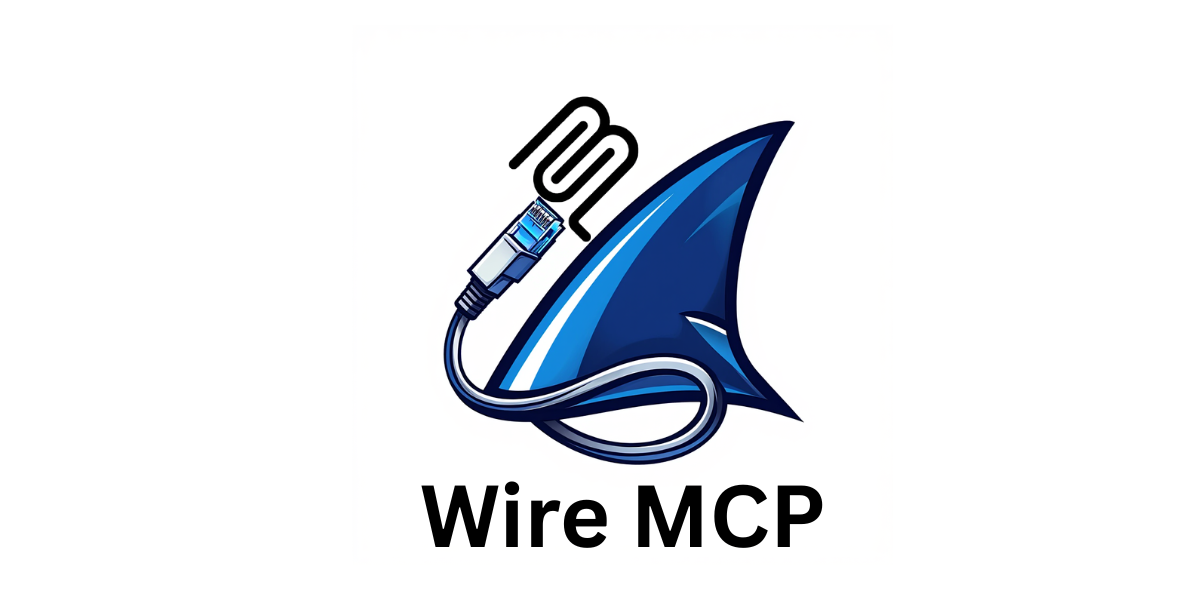WireMCP is a Model Context Protocol (MCP) server that empowers LLMs with real-time and historical network traffic analysis capabilities.
Key functionalities:
Capture and Analyze Live Traffic: Capture packets and provide raw data in JSON format
Get Protocol Statistics: Obtain protocol hierarchy statistics for traffic composition
Track Conversations: Retrieve TCP/UDP conversation statistics
Detect Threats: Check captured IPs against URLhaus blacklist and perform targeted threat intelligence lookups
Analyze PCAP Files: Process PCAP files to provide detailed packet data
Extract Credentials: Scan traffic for potential credentials from protocols like HTTP Basic Auth, FTP, and Telnet
Runs on Node.js environment to power the MCP server, enabling real-time network traffic analysis and processing.
Leverages Wireshark's tshark tool to capture and analyze live network traffic, providing packet-level data, protocol statistics, conversation tracking, and credential extraction capabilities for network diagnostics and security analysis.
Click on "Install Server".
Wait a few minutes for the server to deploy. Once ready, it will show a "Started" state.
In the chat, type
@followed by the MCP server name and your instructions, e.g., "@WireMCPcheck for suspicious IPs in the last 5 minutes"
That's it! The server will respond to your query, and you can continue using it as needed.
Here is a step-by-step guide with screenshots.

WireMCP
WireMCP is a Model Context Protocol (MCP) server designed to empower Large Language Models (LLMs) with real-time network traffic analysis capabilities. By leveraging tools built on top of Wireshark's tshark, WireMCP captures and processes live network data, providing LLMs with structured context to assist in tasks like threat hunting, network diagnostics, and anomaly detection.
Features
WireMCP exposes the following tools to MCP clients, enhancing LLM understanding of network activity:
capture_packets: Captures live traffic and returns raw packet data as JSON, enabling LLMs to analyze packet-level details (e.g., IP addresses, ports, HTTP methods).get_summary_stats: Provides protocol hierarchy statistics, giving LLMs an overview of traffic composition (e.g., TCP vs. UDP usage).get_conversations: Delivers TCP/UDP conversation statistics, allowing LLMs to track communication flows between endpoints.check_threats: Captures IPs and checks them against the URLhaus blacklist, equipping LLMs with threat intelligence context for identifying malicious activity.check_ip_threats: Performs targeted threat intelligence lookups for specific IP addresses against multiple threat feeds, providing detailed reputation and threat data.analyze_pcap: Analyzes PCAP files to provide comprehensive packet data in JSON format, enabling detailed post-capture analysis of network traffic.extract_credentials: Scans PCAP files for potential credentials from various protocols (HTTP Basic Auth, FTP, Telnet), aiding in security audits and forensic analysis.
How It Helps LLMs
WireMCP bridges the gap between raw network data and LLM comprehension by:
Contextualizing Traffic: Converts live packet captures into structured outputs (JSON, stats) that LLMs can parse and reason about.
Threat Detection: Integrates IOCs (currently URLhaus) to flag suspicious IPs, enhancing LLM-driven security analysis.
Diagnostics: Offers detailed traffic insights, enabling LLMs to assist with troubleshooting or identifying anomalies.
Narrative Generation: LLM's can Transform complex packet captures into coherent stories, making network analysis accessible to non-technical users.
Installation
Related MCP server: MCP File Context Server
Prerequisites
Mac / Windows / Linux
Wireshark (with
tsharkinstalled and accessible in PATH)Node.js (v16+ recommended)
npm (for dependency installation)
Setup
Clone the repository:
git clone https://github.com/0xkoda/WireMCP.git cd WireMCPInstall dependencies:
npm installRun the MCP server:
node index.js
Note: Ensure
tsharkis in your PATH. WireMCP will auto-detect it or fall back to common install locations (e.g.,/Applications/Wireshark.app/Contents/MacOS/tsharkon macOS).
Usage with MCP Clients
WireMCP works with any MCP-compliant client. Below are examples for popular clients:
Example 1: Cursor
Edit mcp.json in Cursor -> Settings -> MCP :
Location (macOS): /Users/YOUR_USER/Library/Application Support/Claude/claude_desktop_config.json
Other Clients
This MCP will work well with any client. Use the command node /path/to/WireMCP/index.js in their MCP server settings.
Example Output
Running check_threats might yield:
Running analyze_pcap on a capture file:
LLMs can use these outputs to:
Provide natural language explanations of network activity
Identify patterns and potential security concerns
Offer context-aware recommendations
Generate human-readable reports
Roadmap
Expand IOC Providers: Currently uses URLhaus for threat checks. Future updates will integrate additional sources (e.g., IPsum, Emerging Threats) for broader coverage.
Contributing
Contributions are welcome! Please feel free to submit a Pull Request. For major changes, please open an issue first to discuss what you would like to change.
License
Acknowledgments
Wireshark/tshark team for their excellent packet analysis tools
Model Context Protocol community for the framework and specifications
URLhaus for providing threat intelligence data